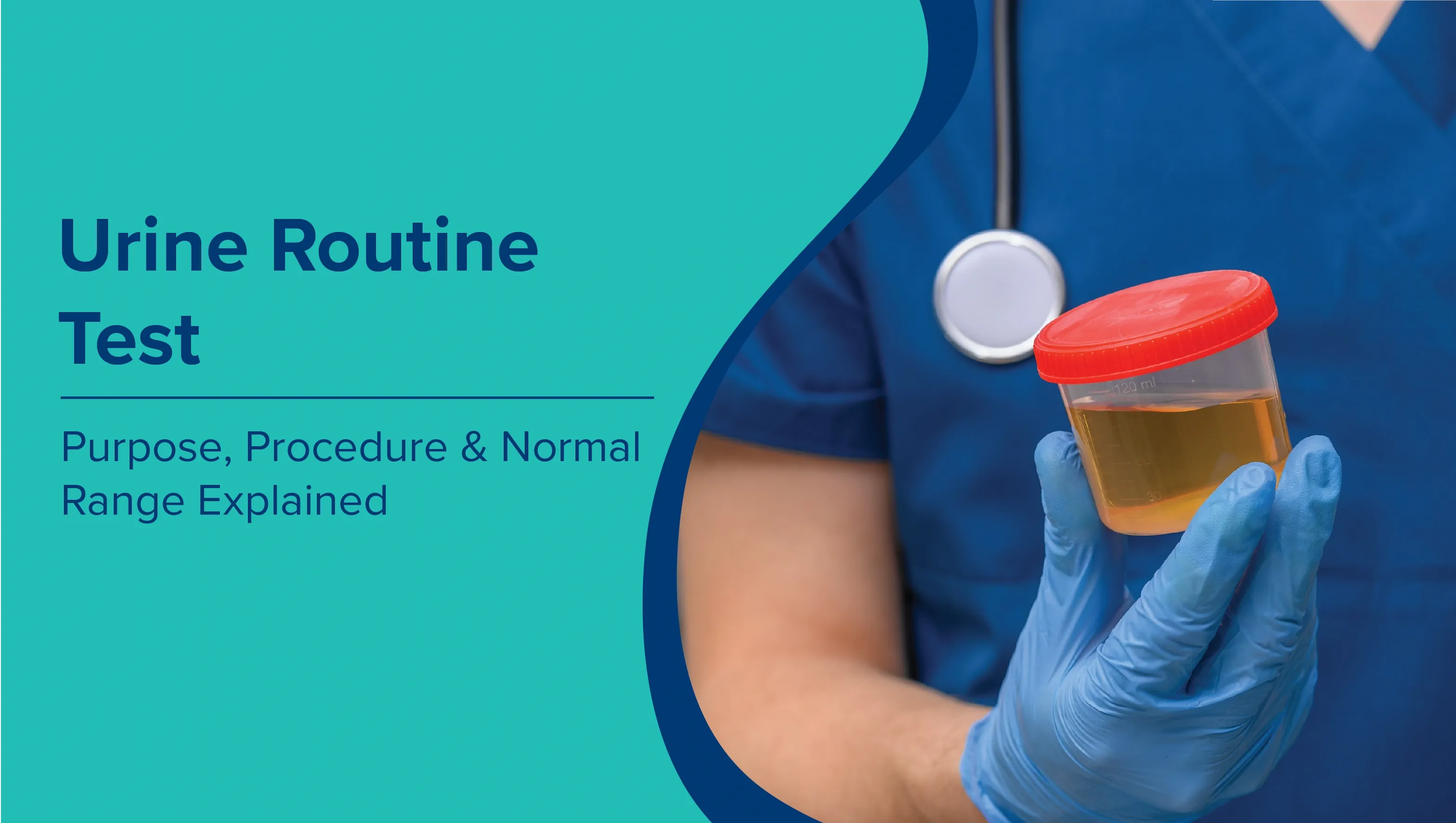Urine routine testing is a simple yet powerful tool that plays a crucial role in detecting a wide range of health conditions, often before symptoms become noticeable. From infections and metabolic issues to kidney or liver dysfunction, a urine routine examination can provide vital early clues. It is commonly included in annual health check-ups, pre-surgical evaluations, and pregnancy monitoring to assess overall well-being. In this article, we will discuss the purpose of a urine routine test, how it is done, normal and abnormal findings, interpretation of results, and when retesting may be necessary. But first, let’s start by understanding the basics.
What is a Urine Routine Test?
A urine routine test, also known as a urine RE test, is a standard diagnostic tool used to assess general health and identify potential medical conditions. It involves a comprehensive urine routine examination that includes physical, chemical, and microscopic analysis of a urine sample. Each aspect offers specific insights, for example:
-
Physical examination observes colour, clarity, and odour.
-
Chemical examination detects substances such as glucose, protein, ketones, and bilirubin.
-
Microscopic examination of urine identifies cells, crystals, casts, and microorganisms that may be present in the sample.
This test is often part of regular health check-ups and is also performed to investigate symptoms such as fever, abdominal pain, or urinary discomfort. It is one of the most commonly prescribed types of urine tests due to its ability to screen for a wide range of health issues using a simple, non-invasive method.
Purpose of Urine Routine Test
Doctors recommend a urine routine test for various diagnostic and monitoring purposes. It helps detect health conditions early and supports ongoing treatment by tracking improvements or changes.
Common purposes of the test include:
-
Assessing kidney function by checking for protein, creatinine, and other indicators.
-
Screening for liver function issues through the presence of bilirubin or urobilinogen.
-
Identifying urinary tract infections (UTIs) by detecting white blood cells, red blood cells, or bacteria.
-
Monitoring blood glucose levels to detect diabetes or assess its control.
-
Evaluating hydration status to detect dehydration through specific gravity or urine concentration.
-
Detecting internal bleeding or haematuria through the presence of blood cells.
-
Routine health check-ups or pregnancy monitoring, especially in prenatal care, to identify early signs of complications.
The broad scope of this test makes it a valuable screening tool in both clinical and home care settings. It supports early diagnosis and timely intervention, reducing the risk of long-term complications.
Urine Routine Test Procedure
A urine routine test is simple, non-invasive, and usually completed within a few minutes. The procedure involves a few straightforward steps, including:
-
Sample collection: A clean-catch midstream urine sample is collected in a sterile container provided by the lab or technician.
-
Ideal timing: The first urine sample of the day is preferred, as it is typically more concentrated and can yield more accurate results.
-
Physical examination: Observes the colour, clarity, and odour of the urine.
-
Chemical examination: Performed using reagent strips to detect substances such as glucose, protein, ketones, pH, bilirubin, and urobilinogen.
-
Microscopic examination: The sediment from centrifuged urine is examined under a microscope to identify red blood cells, white blood cells, epithelial cells, bacteria, crystals, or casts.
Results are usually available within a few hours to a day, depending on the laboratory.
Urine Test Normal Range and What It Means
A urine routine test examines multiple parameters to assess hydration, kidney and liver function, and potential infections. Each result is compared against a standard range to determine if values are within expected limits.
Normal Urine Test Results Chart
|
Parameter |
Normal Range/Appearance |
|
Colour |
Pale yellow to amber |
|
Clarity |
Clear |
|
pH |
4.5 – 8.0 |
|
Specific Gravity |
1.005 – 1.030 |
|
Protein |
Negative |
|
Glucose |
Negative |
|
Ketones |
Negative |
|
Bilirubin |
Negative |
|
Red Blood Cells (RBCs) |
0 – 4 per high power field (HPF) |
|
White Blood Cells (Pus Cells) |
0 – 5 per HPF |
|
Epithelial Cells |
Occasional |
|
Crystals |
Occasional or none |
|
Casts |
Rare or none |
|
Bacteria |
Absent or trace |
In a normal urine routine report:
-
The urine appears pale yellow and clear, indicating good hydration.
-
There are no signs of protein, glucose, ketones, or bilirubin.
-
RBCs and WBCs are minimal or absent, ruling out infections or internal bleeding.
-
Microscopic findings, such as crystals or epithelial cells, are within expected limits if present in small amounts.
Values may vary slightly based on diet, time of day, hydration, and lab methods, but small fluctuations are generally not a cause for concern.
Abnormal Findings in Urine Routine Examination
Abnormalities in a urine routine test can be early indicators of underlying health conditions. Deviations from the normal range often prompt further investigation or retesting.
Common abnormal findings include:
-
Red blood cells in urine (haematuria): May signal urinary tract infections (UTIs), kidney stones, or glomerular disorders.
-
High protein levels (proteinuria): Suggests kidney damage, especially in diabetic or hypertensive individuals.
-
Presence of glucose: Indicates diabetes mellitus or poor glycaemic control.
-
Ketones in urine: Seen in uncontrolled diabetes, starvation, or excessive fat metabolism.
-
White blood cells or pus cells: Point to infections or inflammation in the urinary tract.
-
Bilirubin or urobilinogen: May indicate liver disease or bile duct obstruction.
-
Abnormal urine colour or odour: Can result from infections, medications, or food-related changes.
-
Crystals or casts: When seen in large numbers, may suggest kidney stone formation or tubular disorders.
Each abnormal finding must be interpreted alongside clinical symptoms and may require confirmation through further testing or repeat analysis.
When is a Repeat Urine Test Needed?
A repeat urine routine test, commonly referred to as a urine re test, may be advised when initial findings are unclear, borderline, or indicate a potential health issue that requires confirmation or monitoring.
Typical scenarios for repeat testing include:
-
Post-treatment follow-up after urinary tract infections or kidney conditions, to ensure recovery.
-
Persistent abnormal results, such as ongoing presence of protein, glucose, or red blood cells in urine.
-
Routine pregnancy monitoring, where changes in urine parameters may signal early complications.
-
Monitoring of chronic illnesses like diabetes or hypertension, where kidney function may be affected.
-
Sample contamination or poor collection, which can interfere with test accuracy and require a second, properly collected sample.
In some cases, doctors may also order a urine re-test along with additional investigations to provide a more complete clinical picture.
Book a Urine Routine Test at Home with MaxAtHome
Getting a urine routine test done is now easier and more convenient with MaxAtHome. There is no need to visit a lab or clinic, simply book a home collection and get the test done from the comfort of home. MaxAtHome offers several benefits that make home testing a reliable and hassle-free experience, such as:
-
Hygienic and safe sample collection by trained professionals
-
Timely processing at NABL-accredited labs for accurate results
-
Detailed digital reports delivered promptly
-
Trusted service with over 35 lakh patients served across India
-
Available in major cities, including Delhi NCR, Chandigarh, Mumbai, and more
To book a urine routine test at home, call 9240299624 or schedule the test online through our easy-to-use booking platform.
Frequently Asked Questions (FAQs)
What does a urine test show about your health?
A urine routine test can reveal early signs of kidney disease, urinary tract infections, diabetes, liver problems, and dehydration. It helps assess the body’s metabolic and excretory functions.
What are normal urine test values for adults?
Normal values include pale yellow, clear urine with a pH of 4.5–8.0, specific gravity between 1.005–1.030, and absence of glucose, protein, ketones, or blood cells. Full details are outlined in the urine analysis report normal values chart.
Is fasting required for a urine routine test?
No, fasting is generally not required. However, the first morning urine sample is preferred for accurate assessment.
What can cause abnormal urine test results?
Abnormal findings may result from infections, kidney damage, uncontrolled diabetes, liver dysfunction, or even dehydration. Diet, medications, and menstruation can also affect results.
What does a normal urine routine report look like?
A normal urine routine report typically shows pale yellow, clear urine with no abnormal odour. The pH falls between 4.5 and 8.0, and specific gravity ranges from 1.005 to 1.030. The report should show negative results for glucose, protein, ketones, and bilirubin. Red and white blood cells are either absent or within normal limits, and the microscopic examination of urine reveals minimal epithelial cells, no significant crystals or bacteria, and no casts. These values indicate healthy kidney and urinary tract function.
How can I book a urine routine test near me?
MaxAtHome offers reliable home collection services across multiple cities in India. To book a urine routine test near me, simply call 9240299624 or schedule the test online through MaxAtHome’s user-friendly platform. A trained technician will collect the sample from the doorstep.















